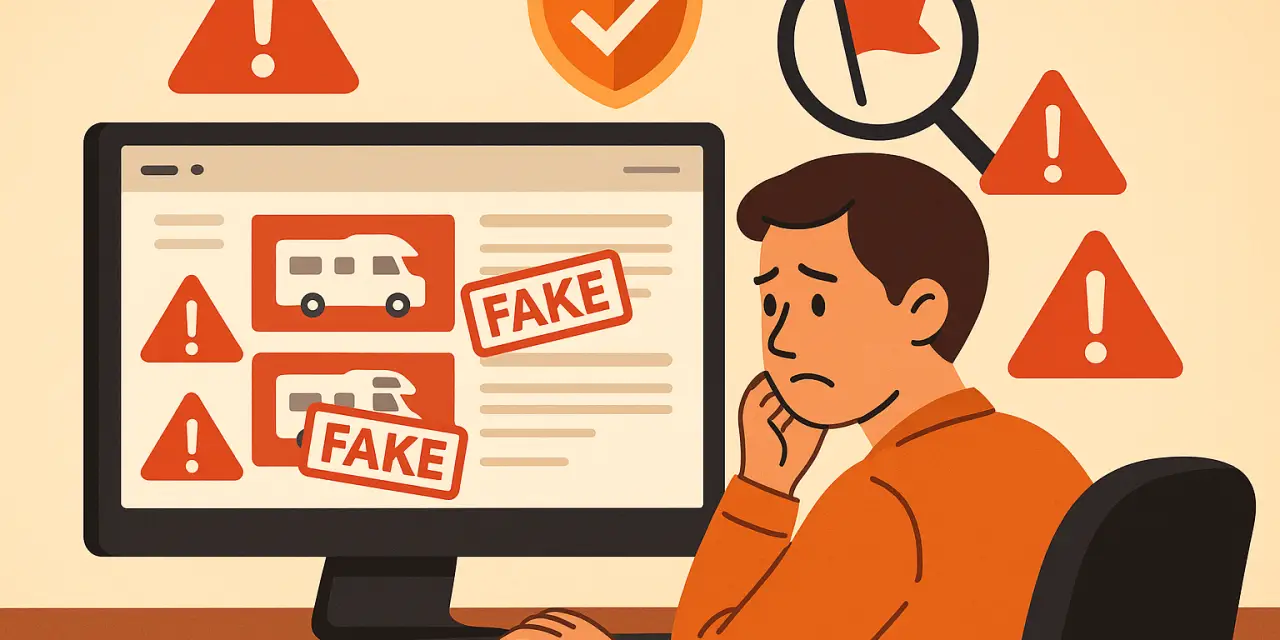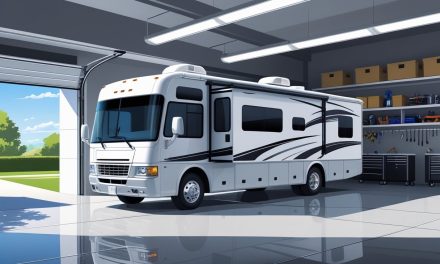Would you like to save this article?
You’ve been scrolling through Facebook Marketplace for weeks, dreaming of that perfect RV adventure. Then suddenly, you spot it – a gorgeous motorhome listed at half the market price, and your heart starts racing with excitement. But before you reach for your wallet, you need to pump the brakes and read this article.
The internet has revolutionized RV buying, making it possible to purchase your dream rig from thousands of miles away, but it’s also created a playground for sophisticated scammers who are getting better at their con games every single year.
According to recent data, online vehicle scams have increased by 21% between 2019-2023, with RV buyers being particularly vulnerable due to the high-value nature of these transactions. These digital predators know exactly how to pull your heartstrings and empty your bank account, but armed with the right knowledge, you can spot their tricks from a mile away.
1. The “Too Good to Be True” Price Tag
When you see an RV listed at an unbelievably low price, there’s usually a very believable reason – it’s fake. Scammers deliberately price their nonexistent RVs at 30-50% below market value because they want your brain to shut off and your emotions to take over. They’re banking on you thinking you’ve discovered the deal of the century.
Supporting Facts:
- The average used RV retains about 60-70% of its value after 3 years
- Legitimate sellers typically price within 10-15% of market value
- Over 40% of reported RV scams involve significantly underpriced vehicles
Red Flag Checklist:
- Price is more than 25% below similar models
- Seller claims they need “quick cash” for emergency
- Multiple similar RVs listed at same suspicious price
- No clear explanation for the low price
Let’s be honest here – if someone was actually selling a $80,000 motorhome for $35,000, they’d have a line of buyers around the block faster than you can say “campground.” The fact that this “amazing deal” is still available after being posted for days should make your scam detector start beeping louder than a smoke alarm with a dying battery.
2. The Mysterious One-Photo Wonder
Legitimate RV sellers know their rig is a major investment, so they’ll photograph it like they’re creating a real estate listing. Scammers, on the other hand, usually steal one photo from somewhere else on the internet and call it a day. You’ll often see just one exterior shot with no interior photos, no close-ups of important features, and definitely no pictures of the VIN number.
Supporting Statistics:
- Authentic RV listings average 15-25 photos
- 78% of scam listings contain fewer than 3 photos
- Stolen photos are used in 65% of fraudulent vehicle listings
Photo Analysis Checklist:
| Legitimate Listing | Scam Listing |
|---|---|
| 15+ photos from multiple angles | 1-3 photos maximum |
| Interior and exterior shots | Usually exterior only |
| Close-ups of features/damage | Generic, distant shots |
| VIN number visible | No VIN shown |
| Consistent lighting/weather | Mixed photo conditions |
Think about it – when you’re selling something worth more than most people’s cars, wouldn’t you want to show off every bell and whistle? These scammers have about as much photography enthusiasm as a teenager being asked to take out the trash.
3. The Sob Story Specialist
Every scammer has perfected their heart-wrenching tale of woe. They’re facing foreclosure, need surgery, their mother is sick, they’re getting divorced, or they’re being deployed overseas. These stories are designed to make you feel sorry for them and explain why they’re selling their beloved RV so cheaply and quickly.
Common Sob Stories:
- Military deployment (very popular)
- Medical emergency requiring immediate funds
- Divorce settlements
- Foreclosure proceedings
- Death in the family
Supporting Data:
- 82% of vehicle scam reports mention seller’s “urgent situation”
- Military deployment is claimed in 35% of RV scams
- Emotional manipulation increases victim compliance by 40%
Here’s the thing about these tear-jerking tales – they’re more recycled than aluminum cans at a summer camp. If you took a shot every time a scammer claimed military deployment, you’d need your own medical emergency. Real sellers might mention their situation, but they don’t sound like they’re auditioning for a daytime soap opera.
4. The Text-Only Communicator
Professional scammers avoid phone calls like vampires avoid sunlight. They prefer texting, emailing, or messaging through apps because it gives them time to craft their responses and maintains their anonymity. When you try to call them, you’ll get excuses about being at work, in a meeting, or having phone issues.
Communication Red Flags:
- Refuses to talk on the phone
- Only responds via text or email
- Uses generic email addresses (Gmail, Yahoo, etc.)
- Delays in responding to direct questions
- Grammar and spelling errors suggesting non-native English
Statistics on Scammer Communication Patterns:
- 91% of vehicle scammers avoid phone conversations
- Text-only communication increases scam success rate by 60%
- Legitimate sellers answer phones 85% of the time
It’s 2025, folks – if someone can’t spare 5 minutes for a phone call about a $50,000 RV sale, they’re either running a scam or they’re so busy they shouldn’t be selling an RV in the first place. Either way, that’s your cue to hit the road.
5. The Upfront Payment Pressure Cooker
This is where scammers turn up the heat. They’ll demand a large deposit or even full payment before you’ve seen the RV in person. They’ll claim they have multiple buyers interested, other people are coming to look at it today, or they need the money immediately for their fabricated emergency.
Payment Pressure Tactics:
- Demands deposits over $500
- Requires full payment before inspection
- Claims multiple other buyers are interested
- Sets artificial deadlines (“sale ends tonight”)
- Refuses to hold RV with reasonable deposit
Financial Impact Data:
- Average loss per RV scam victim: $15,000-$45,000
- 70% of victims sent money within 24 hours of first contact
- Legitimate deposits rarely exceed $300-$500
| Legitimate Seller | Scammer |
|---|---|
| Accepts $100-$300 deposit | Demands $1,000+ upfront |
| Allows time for decision | Creates urgent pressure |
| Welcomes inspection | Discourages in-person viewing |
| Flexible on payment timing | Rigid payment demands |
Real sellers understand that buying an RV is a big decision that deserves careful consideration. Scammers want you making decisions faster than a NASCAR pit stop because they know that thinking time is their enemy.
6. The Inspection Dodger
When you suggest having the RV professionally inspected or request a live video walkthrough, scammers will dance around these requests like they’re doing the cha-cha. They’ll claim the RV is stored somewhere inconvenient, they don’t know how to do video calls, or they’re too busy to arrange an inspection.
Inspection Avoidance Tactics:
- Claims RV is in storage/not accessible
- “Doesn’t know how” to do video calls
- Refuses third-party inspections
- Won’t provide VIN for history reports
- Can’t meet in person due to various excuses
Industry Standards:
- 95% of legitimate sellers welcome inspections
- Professional RV inspections cost $300-$800
- VIN checks reveal problems in 40% of used RVs
- Video walkthroughs are standard practice in 2025
Any seller who won’t let you inspect a $30,000+ purchase is like a restaurant that won’t let you see the kitchen – there’s definitely something funky going on behind the scenes, and it’s not the good kind of funky.
7. The Vanishing Act Documentation
Scammers can’t produce legitimate paperwork because, well, they don’t actually own an RV. When you ask for the title, registration, service records, or any form of identification, they’ll have excuses ready. The title is “being transferred,” the service records were “lost in a move,” or they’ll send you blurry, obviously fake documents.
Documentation Red Flags:
- Won’t provide clear title photos
- No service history available
- Refuses to show ID matching title name
- Claims paperwork is “in process”
- Provides blurry or obviously altered documents
Legal Requirements:
- Title must match seller’s identification
- Service records increase RV value by 10-15%
- VIN numbers must be clearly visible and verifiable
- Registration should be current and valid
Verification Statistics:
- 88% of legitimate sellers provide title photos within 24 hours
- Fake documents are used in 75% of vehicle scams
- VIN verification prevents 90% of title fraud cases
Listen, if you’re buying a candy bar, documentation isn’t a big deal. But when you’re purchasing something that costs more than a college education, you want more paperwork than a tax audit. Anyone who can’t produce basic ownership documents is shadier than a campsite in a pine forest.
Protection Game Plan: Your Anti-Scam Toolkit
Now that you know what to watch for, here’s your action plan to avoid becoming another statistic:
The Golden Rules:
- Always talk live – Insist on phone or video calls
- Demand documentation – Title, ID, service records
- Request live video tours – No exceptions
- Limit deposits – Never more than $500
- Get professional inspection – Worth every penny
- Meet in person – For final transaction
- Trust your gut – If it feels wrong, it probably is
Payment Safety Protocol:
- Never wire money or use untraceable payment methods
- Meet at seller’s bank for final transaction
- Verify funds clear before taking possession
- Use cashier’s checks or bank transfers only
- Complete title transfer at DMV when possible
Conclusion: Your RV Dreams Don’t Have to Become Nightmares
You don’t have to let these scammers ruin your RV dreams. The legitimate RV market is full of honest sellers who want nothing more than to pass their beloved rig on to someone who’ll create new memories in it. By following these warning signs and protection strategies, you can confidently navigate the online RV marketplace without falling victim to these digital con artists.
Remember, there will always be another great RV deal coming along. It’s better to walk away from a suspicious situation and wait for the right opportunity than to lose your hard-earned money to a scammer who’s probably already moved on to their next victim.
Stay vigilant, trust your instincts, and happy RV hunting!
SOURCES
- RV Private Seller Scams – Don’t Get Taken By These Con Artists! (YouTube){:target=”_blank”}
- BBB Study Update: Virtual vehicle vendor scams and related fraud persist post-pandemic{:target=”_blank”}
- How to Avoid Common Scams When Buying a Used RV – SE Financial{:target=”_blank”}
- How to Avoid Scams when Buying a Campervan or Motorhome – VanLife Hub{:target=”_blank”}
- Selling Safely: Avoiding Scams and Fraud in the RV Market – National Vehicle{:target=”_blank”}
- How to avoid scams when buying an RV online – RV Travel{:target=”_blank”}





